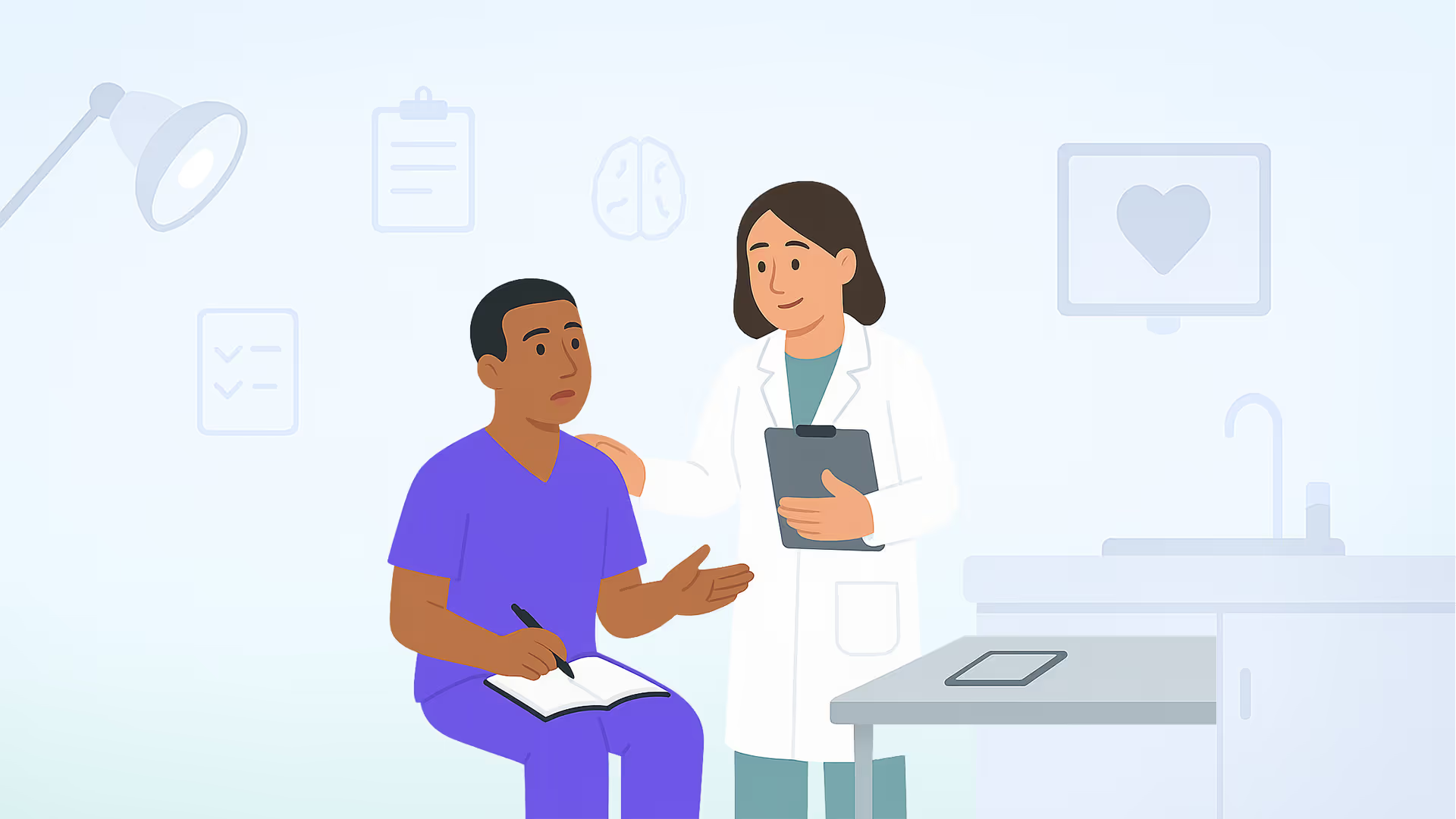High-quality clinical experiences are a critical component of NP education because they provide nurse practitioner students with the hands-on exposure, critical thinking practice, and real-world application of skills needed to safely and confidently care for patients. These experiences bridge the gap between theory and practice, shaping clinical judgment, professional identity, and long-term success in advanced nursing roles.
TL;DR: Clinical Experience Nursing: Why Quality Experiences Are Important for NP Students?
- Not All Clinicals Are Equal – You might meet the hour requirements, but only high-quality placements help you actually learn, grow, and feel confident as a future NP.
- Preceptors Make or Break You – A great preceptor teaches, gives feedback, and gradually builds your autonomy. A bad one lets you shadow in silence and sends you out unprepared.
- Hands-On > Observing – Real clinical education means treating diverse patients, making decisions, and getting your hands (safely) dirty—not just watching from the sidelines.
- Poor Clinicals = Big Problems – Low-quality rotations can lead to delayed graduation, lost confidence, and gaps in your clinical skills you’ll feel for years.
- Vetting Preceptors = Protecting Your Future – Start early, ask smart questions, and use services like NPHub to ensure your clinical isn’t just good enough—it’s transformative.
Clinical Hours Are Just the Beginning
As an NP student, you already know the checklist: complete your clinical hours, meet your clinical faculty requirements, and check off rotations in primary care, acute care, or your chosen specialty.
But here’s the part most nurse practitioner programs don’t emphasize enough: not all clinical experiences are created equal.
A rushed, low-volume clinical setting where you’re sidelined as a silent observer might technically count toward your NP program, but high-quality clinical settings—characterized by staff engagement, ethical practice, and patient safety—are key factors in preparing you to lead real patient care.
The difference between surviving your clinical placements and truly thriving comes down to one thing: the quality of your clinical experience.
This blog breaks down why that quality matters so much, from developing core competencies and building clinical confidence, to learning how to make safe, independent clinical decisions as a future advanced practice nurse.
We’ll also explore how experienced nurse practitioners, diverse patient populations, and supportive clinical sites play a role in shaping not just your skillset but your professional identity as an NP.
What Makes a Clinical Experiences for Nurse Practitioners “High-Quality”?
Completing the required clinical hours is a baseline. But the difference between a clinical that checks a box and one that transforms you into a capable, confident nurse practitioner lies in the quality of that experience.
Securing clinical placements is often a complex process that requires careful planning and coordination to ensure students gain access to high-quality learning environments.
High-quality clinical experiences for NP students create a space where knowledge becomes action, theory meets practice, and confidence is earned not assumed. Here’s what that looks like in practice:
Supervision by Experienced, Engaged Preceptors
One of the most critical components of strong nursing clinicals is the presence of a skilled, supportive NP preceptor. These are experienced nurse practitioners or healthcare professionals who are not only clinically competent, but committed to guiding NP students through the complexities of clinical practice. The best preceptors are well versed in clinical practice and current regulations, ensuring students receive up-to-date and comprehensive mentorship.
A quality preceptor will:
- Offer regular constructive feedback and guidance on clinical decisions
- Model evidence-based care and interprofessional collaboration
- Create opportunities for critical thinking through case discussions and diagnostic reasoning
- Know how to gradually increase your autonomy without compromising patient safety
Most preceptors volunteer their time to mentor students, and their willingness to teach can vary.
Without this level of mentorship, nurse practitioner students are left to guess their way through their rotations—something no one should have to do in a high-stakes clinical setting. Clinical sites with experienced NPs provide a richer learning environment for students, supporting their development into competent advanced practice providers.
Hands-On Experience With Diverse Patient Populations
Exposure to a wide range of patient populations is crucial for building adaptable, real-world clinical skills. A quality placement ensures that NP students engage with a variety of ages, socioeconomic backgrounds, and medical complexities—an experience that can’t be replicated in the classroom.
This includes:
- Treating pediatric, adult, and geriatric patients (especially important for family nurse practitioners)
- Managing acute, chronic, and preventive care needs
- Gaining hands-on experience in diverse clinical environments such as primary care, hospitals, and specialty clinics
- Practicing cultural competence and sensitivity in real-time patient encounters
- Understanding how health disparities affect access, communication, and clinical outcomes
These hands-on experiences don’t just help students pass—they prepare them to serve better in an increasingly diverse healthcare system.
Real Participation in Patient Care
A quality clinical rotation experience allows nurse practitioner students to go beyond shadowing and take active roles in patient care—under supervision, of course. This kind of practical experience allows students to test their knowledge in the safety of a learning environment. Completed rotations in different clinical environments further enhance students' clinical skills and cultural competence by exposing them to diverse patient populations and care settings.
High-value placements include opportunities to:
- Perform physical assessments and formulate differentials
- Contribute to treatment plans and monitor outcomes
- Practice documentation, including SOAP notes and electronic charting
- Communicate with patients, families, and the broader care team
When students are allowed to function as contributing members of the care team, their clinical confidence and professional identity grow exponentially.
Clear Objectives, Feedback, and Professional Growth
Quality clinical experiences don’t just happen—they’re designed with purpose. From day one, there should be clear learning goals, structured mentorship, and space for ongoing support. Preceptors and students should work together to assess progress and adjust as needed.
A well-structured rotation should provide:
- Weekly or mid-rotation check-ins to assess learning
- Timely feedback to help students refine their skills
- Specific goals aligned with NP program objectives and core competencies
- Opportunities to reflect on growth, challenges, and professional development
These elements help bridge the gap between your educational background and your readiness to enter advanced practice.
What Happens When Clinical Experiences for NP Students Fall Short?
Some nurse practitioner students complete rotations that look great on paper but provide minimal learning, no feedback, and limited patient interaction. These clinical rotations often take place in healthcare facilities where the environment may not support optimal learning. The quality of healthcare facilities can significantly impact the overall clinical experience and the opportunities available to students.
Unfortunately, many students don’t realize the consequences of a poor clinical until it’s too late, when they’re underprepared, overwhelmed, and struggling to feel ready for practice.
Here’s how low-quality experiences can derail your NP education and your transition to the advanced practice nurse role:
Limited Exposure = Limited Skill Development
When you’re placed in a clinical site with low patient volume, unclear expectations, or a disinterested preceptor, you miss out on the hands-on experiences that build essential clinical skills. Limited access to hospitals during clinical rotations can further restrict opportunities for hands-on patient care, as hospitals are key environments for managing a wide range of cases. You can’t learn how to manage complex cases if you’re barely seeing any.
Common signs of an underwhelming rotation:
- You’re shadowing 95% of the time with no real interaction
- You’re not allowed to perform physical assessments or present patient cases
- You log your clinical hours, but gain little clinical confidence or decision-making experience
Lack of Feedback Leads to Stagnation
Without regular, specific constructive feedback, students don’t know what they’re doing well—or what they need to improve. This delays growth and increases anxiety during future rotations and eventually, in independent practice.
The consequences of weak feedback loops:
- Students carry the same clinical mistakes forward
- They develop poor habits in documentation, patient communication, or assessment
- They feel unsure about their abilities even after completing multiple clinical rotations
Graduation Delays and Credentialing Issues
If a clinical placement fails to meet your nurse practitioner program’s requirements—due to preceptor ineligibility, insufficient hours, scope mismatch, or difficulty finding preceptors—it could result in:
- Repeating the rotation
- Delaying graduation
- Losing tuition money or financial aid eligibility
- Falling behind peers in a competitive job market
With NP clinical experience opportunities already limited, this kind of setback can feel devastating.
Emotional Burnout and Loss of Confidence
The emotional toll of a poor clinical rotation experience can’t be overstated. Students report feeling defeated, unsupported, and uncertain about their path forward. This is particularly common for recent graduates or those switching specialties within nursing clinicals.
Key emotional impacts include:
- Doubting your readiness to care for patients independently
- Losing motivation during the final stretch of your educational journey
- Questioning whether you’re truly prepared for your NP role
From Student to Provider: How Quality Clinical Experiences for Nurse PractitionersNP Shape Professional Identity
Every nurse practitioner student enters clinicals with a solid foundation of academic knowledge, but what turns that education into true clinical competence isn’t just time spent in a clinic—it’s the depth and quality of the clinical experience itself. Nurse practitioner clinicals are a key part of the journey from student to provider, offering essential hands-on experience that shapes your professional identity.
A great clinical placement doesn’t simply teach you how to check boxes or follow protocols. It helps you learn how to think like a provider, lead like a professional, and begin forming the professional identity you’ll carry into every exam room for the rest of your career.
This transformation doesn’t happen by accident, it happens through intentional, high-quality clinical experiences that challenge you to grow in both skill and confidence.
Confidence, after all, is built through meaningful repetition, not passive observation. When you’re placed in a setting where you’re regularly performing assessments, participating in care planning, and engaging in real patient encounters, you begin to trust yourself more with each case.
These repeated opportunities, especially when guided by an experienced NP preceptor, help you feel the weight and responsibility of real decision-making in a way that’s both empowering and safe.
The more diverse and complex your experiences, the more adaptable and confident you become, not just in treating patients but in navigating the unpredictable nature of healthcare environments. It’s this active, hands-on learning that strengthens your clinical instincts and builds your capacity to respond with clarity under pressure.
At the same time, clinicals are where your critical thinking finally comes to life. In the classroom, you memorize facts. In the clinic, you learn to make choices.
A quality clinical rotation teaches you how to assess subtle cues, think through differential diagnoses, and adjust treatment plans on the fly. You’re not just absorbing information, you’re applying it, testing it, refining it. Each patient interaction gives you the chance to put core competencies into practice, moving beyond academic theory into dynamic, real-time care.
This kind of thinking isn’t about just getting the right answer on a test, it also leads to learning to think like a clinician, and that kind of mental shift is only possible through consistent, high-stakes exposure in a supportive setting.
Perhaps most importantly, strong clinicals help you step into your future role as an advanced practice provider. They’re where you begin to shift from being a student to becoming a peer. The way your preceptor engages you, the autonomy they allow, and the respect they show for your evolving skill set all shape how you’ll see yourself as a provider.
You start making decisions, advocating for your patients, and owning your communication. These skills are the backbone of your success in real-world practice. By the time you complete a well-structured clinical rotation, you’re not just checking off a requirement.
You’re stepping into your identity as a nurse practitioner, ready to lead care and support patient outcomes with confidence and clarity.
Why Vetting Preceptors Matters and How to Secure the Right Match
Not every licensed provider is ready—or even willing—to be a great preceptor. And for nurse practitioner students, the consequences of ending up in the wrong clinical match are significant. From delayed graduation to poor preparation for boards or practice, a bad rotation can set you back emotionally, academically, and professionally. That’s why vetting preceptors isn’t just a nice-to-have—it’s a non-negotiable step in protecting the quality of your clinical education.
A vetted preceptor isn’t just someone with a license and a clinic. They’re a healthcare professional who has been reviewed for their ability to teach, communicate, and provide a structured learning experience.
These are individuals who understand nurse practitioner programs, know what your school expects, and are willing to dedicate time to your development—not just squeeze you into their patient load. NP programs often follow guidelines set by organizations such as the American Association of Nurse Practitioners when evaluating preceptors to ensure high standards in clinical education.
Working with vetted preceptors increases your odds of receiving clear expectations, meaningful feedback, and a fulfilling clinical experience that contributes to your long-term growth as an advanced practice nurse.
Here’s what a properly vetted preceptor often brings to the table:
- At least one to two years of post-certification experience in their specialty
- A clear understanding of their role as an educator and mentor—not just a provider
- A track record of hosting students and completing evaluations on time
- Experience with diverse patient populations and strong interprofessional collaboration skills
- An active interest in teaching core clinical skills like assessments, documentation, patient education, and differential diagnosis
Unfortunately, many NP students still rely on informal networking, cold calling clinics, or asking classmates for leftover contacts—which often leads to uncertainty, last-minute cancellations, and placements that don’t meet program standards.
That’s where using a clinical placement service like NPHub can dramatically improve your outcome. With tools to match you to available preceptors by specialty, location, and semester, plus a personalized matching process and real-time support team, services like this turn a complex, frustrating process into one that’s actually manageable—and aligned with your clinical needs.
To ensure you secure a preceptor who helps you grow instead of holding you back, NP students should:
- Start the preceptor search at least 3 to 6 months before the rotation
- Double-check the preceptor’s credentials and specialty alignment with your program’s requirements
- Ask clear questions during the interview phase: How do you like to teach? How much autonomy will I have? What’s the typical patient volume?
- Get everything in writing—availability, expectations, and whether there are any affiliation agreements or documents your school needs to approve
- Choose quality over convenience: a longer commute or small out-of-pocket cost is often worth it if it means you’ll get real, skill-building clinical experience
Remember: the right preceptor isn’t just someone who says “yes.” It’s someone who is prepared to invest in your success and help you thrive in a real clinical setting. Taking the time to vet your preceptor properly means protecting your education, your time, and your future role as a safe, skilled, and confident nurse practitioner.
Your Clinical Experience Should Empower You, Not Hold You Back
You didn’t come this far to feel unprepared when it matters most. You’ve invested in your NP education, balanced work and family, and studied your way through anatomy, pharmacology, and pathophysiology. But none of it fully clicks until you're in the room with a patient, making decisions that matter—and that's why your clinical experience needs to be more than just “good enough.”
A quality clinical isn’t a checkbox. It’s a launchpad.
It’s the difference between walking into your first job with confidence versus questioning if you’re ready. It’s the clarity that comes from real patient encounters, the strength you build from meaningful feedback, and the self-trust that only grows when you’ve been given space to learn, lead, and succeed.
When you choose a high-quality, vetted preceptor—someone who’s truly invested in your growth—you’re not just securing a rotation. You’re stepping into the version of yourself that you’ve been working toward: the provider, the leader, the advanced practice nurse who’s ready to show up, speak up, and deliver care that actually changes lives.
Don’t settle for a placement that leaves you feeling like an outsider in your own education. You deserve more. You deserve to learn from someone who believes in teaching, who challenges you to rise, and who sees the clinician you’re becoming.
Ready to take control of your clinical future?
👉 Explore Vetted NP Preceptors at NPHub and match with someone who’s as ready to teach as you are to lead. Because the right clinical experience doesn’t just prepare you to graduate—it prepares you to thrive.
Frequently Asked Questions
1. Why are clinical experiences important in NP education?
High-quality clinical experiences for nurse practitioners are essential because they provide hands-on learning that bridges the gap between theory and real-world clinical practice. They help students develop clinical confidence, critical thinking, and core competencies necessary for safe, effective patient care.
2. How many clinical hours do NP students need to complete?
Most nurse practitioner programs require students to complete between 500 and 700 clinical hours, depending on the specialty. These hours are usually divided across several clinical rotations in areas like primary care, mental health, women’s health, and acute care.
3. What makes a clinical site high quality for NP students?
A strong clinical site offers active preceptor involvement, exposure to diverse patient populations, adequate patient volume, and opportunities for hands-on skill application. These environments prioritize clinical education and create a supportive space for professional development.
4. Can I choose my own preceptor or site for NP clinicals?
Yes, many schools allow NP students to secure their own clinical placements—but preceptors must meet the program’s requirements and the site may need an affiliation agreement. That’s why clinical placement services can help ensure your rotation is approved and aligned with your program.
5. What happens if my preceptor cancels or isn’t a good fit?
If a preceptor cancels or the match isn’t working out, it could delay your semester or even your graduation. That’s why working with vetted preceptors and clinical placement services like NPHub can help prevent surprises and provide ongoing support if issues arise.
6. Do all nurse practitioner students get hands-on experience?
Ideally, yes—but not all NP clinical experiences are created equal. Some nursing clinicals may limit hands-on practice, especially if the preceptor is disengaged or overbooked. That’s why choosing a preceptor who prioritizes education is key to getting meaningful, practical experience.
7. How do clinical experiences shape my future as a nurse practitioner?
They help you build confidence, solidify your professional identity, and prepare you for independent clinical decisions. A strong clinical rotation experience trains you to think critically, communicate clearly, and deliver high quality care to complex patient populations.
8. Is it worth paying for a preceptor or clinical placement service?
For many students, yes. While it’s ideal to find a preceptor through your own network, paying for a clinical match through a reputable service ensures you avoid last-minute cancellations, meet deadlines, and gain access to experienced nurse practitioners who are ready to teach.
Key Terms
- Clinical Experience Nursing
Hands-on, supervised training in a healthcare setting that allows NP students to apply classroom knowledge in real-world scenarios. - Nurse Practitioner Students
Individuals enrolled in a graduate-level NP program pursuing advanced practice licensure and training in specialties like family practice, mental health, or acute care. - Clinical Rotations
Structured periods during which NP students work under a preceptor in various healthcare settings to fulfill required clinical hours and develop competencies. - Preceptor
A licensed healthcare provider (typically an NP, MD, or DO) who supervises and mentors students during their clinical rotations. - Vetted Preceptors
Preceptors who have been screened and approved based on their credentials, teaching ability, experience, and alignment with NP program standards. - Clinical Placement Services
Organizations or platforms that help NP students find, match with, and secure qualified preceptors for their required clinical rotations. - Clinical Hours
The specific number of hours NP students must complete under supervision in a clinical setting to meet program and certification requirements. - Advanced Practice Nurse
A licensed RN with advanced education (usually a master’s or doctoral degree) who practices as a nurse practitioner, nurse midwife, clinical nurse specialist, or nurse anesthetist. - Patient Encounters
Interactions between NP students and patients during clinicals, including assessments, treatments, and follow-up care, supervised by a preceptor. - Professional Identity
The evolving sense of oneself as a healthcare provider, shaped through clinical experience, mentorship, and participation in real-world patient care.
About the author
- NPHub Staff
At NPHub, we live and breathe clinical placements. Our team is made up of nurse practitioners, clinical coordinators, placement advisors, and former students who’ve been through the process themselves. We work directly with NP students across the country to help them secure high-quality preceptorships and graduate on time with confidence. - Last updated
May 28, 2025 - Fact-checked by
NPHub Clinical Placement Experts & Student Support Team - Sources and references
Find a preceptor who cares with NPHub
Book a rotation.webp)








.webp)


.webp)



%20(3)%20(2).svg)
.webp)